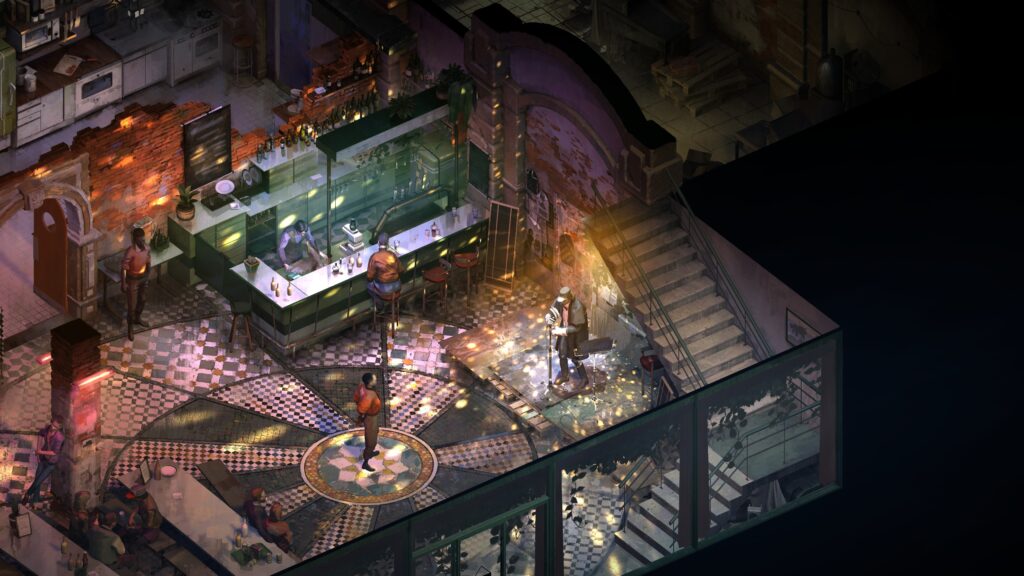
This is one game I always knew I had to play even back when it was first released. Yet putting it off was the right decision because all the additions made to the final edition of the game including most importantly fully voiced dialogue for all characters makes it so much better. The voice acting is so critical and of such high quality in this game that I couldn’t imagine experiencing this game without it. There are some flaws in this game, such as how the plot is railroaded to go through some key bottlenecks no matter what you decide to do. But I love this type of dialogue-heavy, skill check-based RPG and I really want developers to make more games like this.
Most people will advise you to go into this cold without knowing anything in advance. Personally I would prefer knowing at least a little first but it’s a valid concern so spoiler warning here. The plot is that you’re a man who wakes up in a motel room with totally no memory of anything. You don’t know who you are, what you do, where you are, not even what the world is like. That’s really because you the player are playing a game set in a world you know nothing about but the story totally leans into it. It even allows you to ask totally inane questions like what money is to your bewildered interlocutors. Thankfully downstairs in the motel that you soon learn is called the Whirling-in-rags, you meet a colleague Lieutenant Kitsuragi and you learn that you’re a police officer here in a bad part of the city to investigate a murder. The bad news is that you’ve already been there already for a few days on the mother of all alcohol-fueled benders, terrorizing the motel staff, trashing your room, losing your police badge and gun and not doing any work whatsoever including taking the corpse down from the tree where it is still hanging.
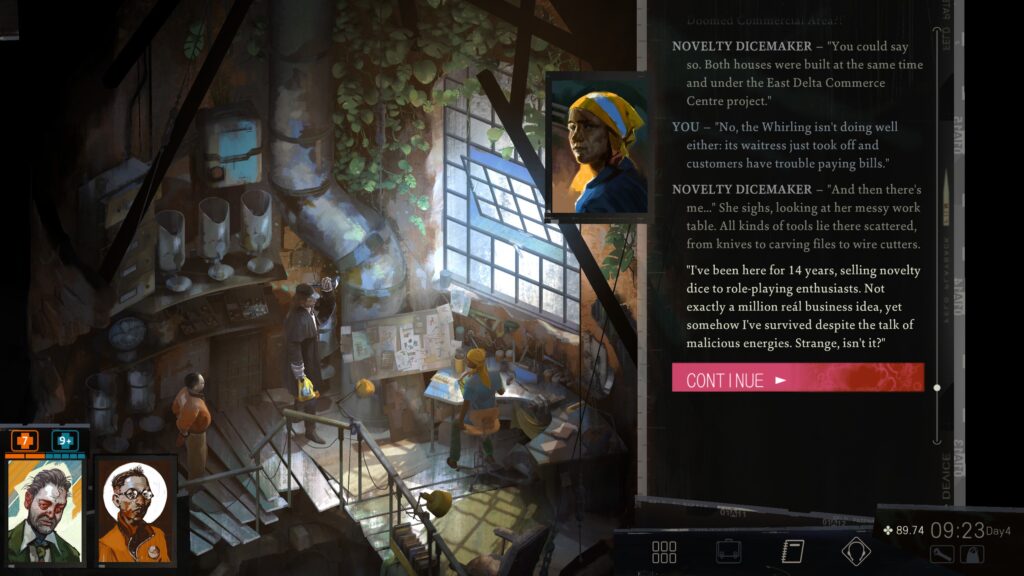
Across the next several days, your objective is to solve the murder together with Kitsuragi while also figuring out who you are and perhaps working through the trauma that caused you to lose your memory. As this world is definitely not Earth, this also entails learning about the city you find yourself in, its long history and culture and the factions struggling over both its present and its past and even the world at large. The worldbuilding is extensive as even the topology of this world is nothing at all like Earth. The themes and ideologies are familiar: racism, misogyny, fascism, communism, capitalism and much more and your character is constantly asked to take a side. All this matters as the dead man is at the center of an ongoing strike between the union of dockworkers and the multinational corporation that owns the docks. As Kitsuragi will remind you, the police or more specifically the Revachol Citizens Militia too is a faction, authorized by what is effectively the occupying power of the city to maintain law and order.
This is a true RPG, in that you have health, skills and even equipment slots for your character. You earn xp for doing tasks in the game and this earn you extra skill points. There is no combat system so while there are combat situations, these are handled entirely via skill checks like everything else in the game. You still lose health, both physical and morale, from doing things like trying and failing to bash down a door or having an interlocutor saying something mean to you that rings true. Wearing different clothing items affects your skills and you can equip different tools for different situations, such as using a flashlight while exploring a dark room. One somewhat new mechanic is the thought cabinet which lets you equip thoughts, or really ideologies and personal philosophies. You unlock these as you react to events in the game, so if you keep selecting dialogue responses that support communism you’ll be offered the opportunity to internalize that philosophy. These can sometimes provide unique responses to events. In terms of game mechanics, at the boring end, they’re just more bonuses to skills. But some have unique effects, such as earning free money whenever your inner encyclopedia recalls some probably useless fact.
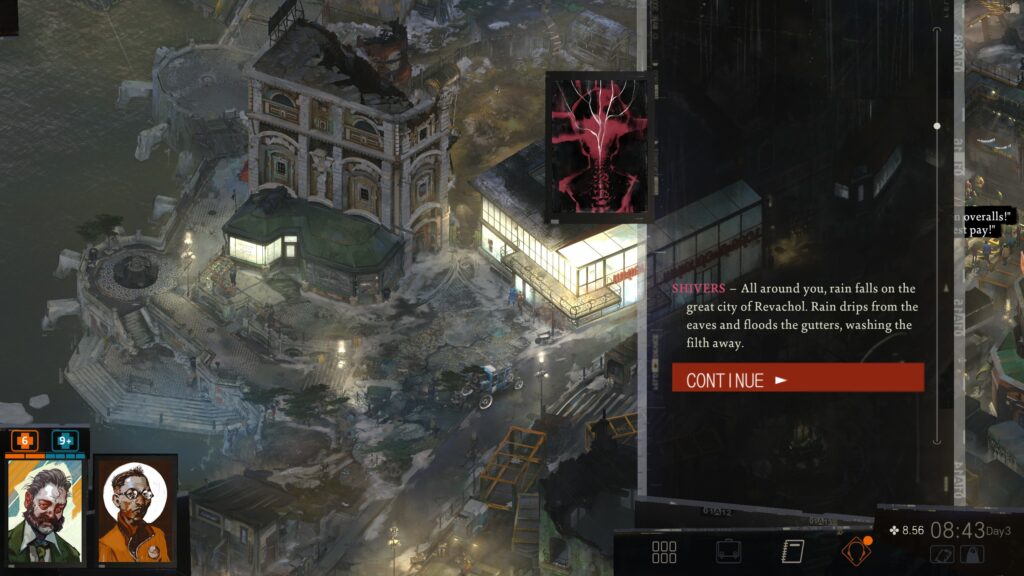
The map in this game is tiny by RPG standards and you’ll find yourself traversing the same areas over and over again. However it is very dense with interactive elements and points of interest. I also love somewhat the water-color inspired art style and how much detail there is. But the true strength of the game is its writing and there is so much of it that this could be said to really be a kind of novel. As I’ve recently read someone comment, this too is a game of exploration, but one not of space but history. The history of the city of Revachol and this neighborhood of Martinaise in particular, and also that of the many characters in it. Naturally your own personal past takes prominence but you might also work on breaking down the reserve of your partner Kitsuragi who doesn’t like to talk about personal matters or wonder at the home life of the obnoxious street kid Cuno who has been throwing stones at the hanging corpse, or listen patiently to the old war veteran who is always proud to recount tales of past glories.
Now it may be that people are used to very long dialogue in games but trust me, you’ve never seen something like this. Many of the conversations are so long and complex that speaking to one person could take up an entire gaming session. The facts that you learn, things that you hear from others and ongoing events all affect the dialogue options so you often have to speak with the same person multiple times. I am in awe of the incredible complexity of the dialogue trees and the amount of effort that it must have taken to keep track of so many moving parts. As many will already know, in addition to the people out in the world, the many different aspects of yourself are characters too and you can talk to them. The information that you can get and the decisions that you make while talking to yourself directly affect the options you have out in the real world. Your skills especially are some of those pieces of yourself with how outspoken their voices are correlating with how high you pump them up. For example the skill Physical Instrument measures how strong you are and how well you use brute force to solve problems. Naturally it keeps egging you to just go around smashing faces in but as the skill goes higher, it also takes on a misogynistic tone that denigrates women. The inner voices will even talk with each other so you can imagine how complicated those conversations get.
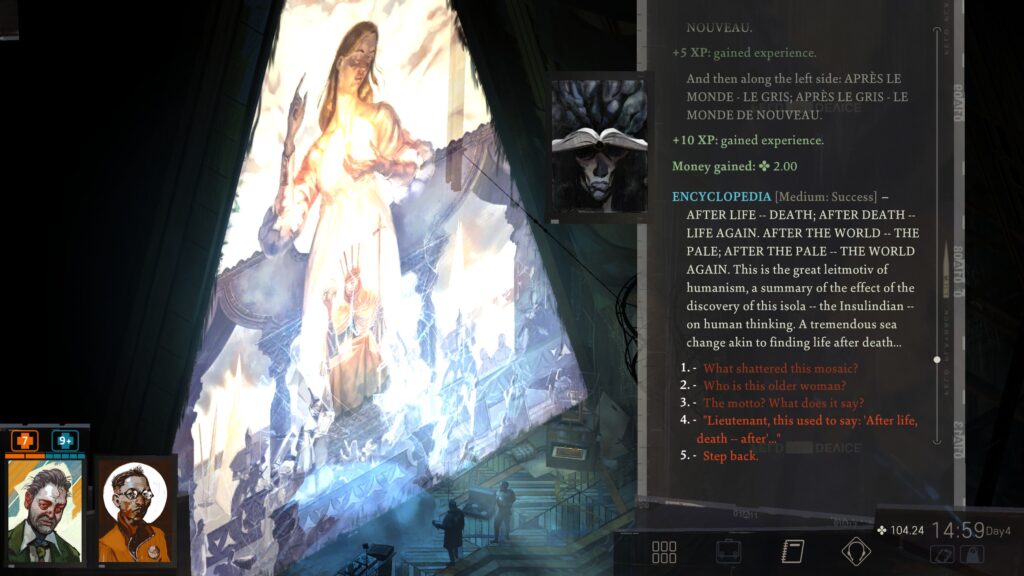
Some might characterize the writing as being overdone, but I think it’s great and strikes exactly the right tone the game is going for. Combined with what is to me some of the best voice acting in any game ever made, it makes for an electrifying storytelling experience. The plot has all of the elements of classical noir with just about everyone having secrets to hide. What seems at first like an open and shut turns out to have layers and layers to it. I love the main character’s interactions with Kitsuragi who is frequently impatient with you following up on things that seem unrelated to the case but later turn out to be connected after all. There is a kind of supernatural element involved and depending on your skill selection your character may have the ability to tap into the currents of the city and other people, allowing you to have hunches and insights that seem impossible to the more by-the-book Kitsuragi. About the only part of the story I kind of dislike is how so many characters, including yourself, turn out to be fixated on the femme fatale.
As I’ve mentioned elsewhere on the subject of films, I’m not a big fan of stories that are about drug or alcohol-fueled benders. Still this is one of the better examples of the genre. It’s actually disappointing that it seems relatively easy to stay sober or drug-free as there aren’t really any game mechanics that push you towards alcohol and drugs. Most of all it made me really wish there were more police/investigative games that leaned so heavily into text-based storytelling. I don’t need the amnesia angle or even the more fantastical aspects of this world. Just give me a few cases to solve, a time limit, and some mechanic to learn access to additional resources like a toxicology lab and so forth. I really love how time passes in this game by the way. Walking around the map doesn’t advance the time at all so you can explore at leisure and take your time to admire the visuals. But doing anything, such as reading a report or having a conversation causes time to pass. The more things the person has to say, the more time you need. Even having more RPGs that don’t have a combat system and instead resolve everything through skill checks would be great too.
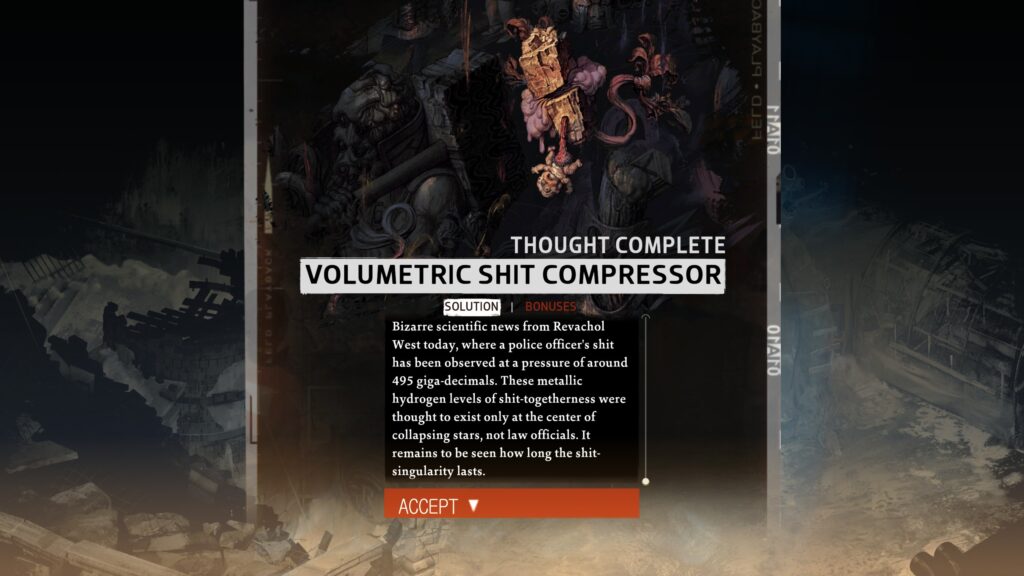
There are a few things that I think could be better. Having to swap around clothing items to optimize your skills for particular tasks is silly and leads your character to walk around wearing a ridiculous assortment of badly matching items. It’s best to just eliminate that mechanic entirely. Then there’s the fact that even though you can approach situations and people in several different ways, the plot is still bottlenecked by the same key events no matter what you do. To me this limits replayability and gives the impression that your actions matter less than you initially thought. Finding the real murderer at the end of this game reinforces this impression. Even so I really love this title and I believe it is one of the most unique titles out there. Please other developers: be inspired by this and make more games like it!